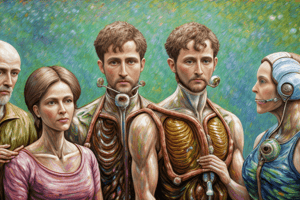Podcast
Questions and Answers
Koje su osnovne razlike između endokrinih i egzokrinih žlezda?
Koje su osnovne razlike između endokrinih i egzokrinih žlezda?
Endokrine žlezde luče proizvode u intersticijalnu tečnost, dok egzokrine žlezde luče proizvode u kanale.
Šta čini endokrini sistem?
Šta čini endokrini sistem?
Sve endokrine žlezde i ćelije koje luče hormone.
Kako hipotalamus prima signale i odakle dolaze ti signali?
Kako hipotalamus prima signale i odakle dolaze ti signali?
Hipotalamus prima signale od drugih delova tela, uključujući limbicni sistem, cerebralni korteks, talamus, retikularni aktivacioni sistem (RAS), unutrašnjih organa i retine.
Kakva je funkcionalna povezanost između hipotalamusa i adenohipofize?
Kakva je funkcionalna povezanost između hipotalamusa i adenohipofize?
Šta je adenohipofiza i koji hormoni se luče iz nje?
Šta je adenohipofiza i koji hormoni se luče iz nje?
Kako hipotalamus kontroliše lučenje hormona adenohipofize?
Kako hipotalamus kontroliše lučenje hormona adenohipofize?
Šta uzrokuje promene na hipotalamusu?
Šta uzrokuje promene na hipotalamusu?
Kako hormoni utiču na ciljane ćelije?
Kako hormoni utiču na ciljane ćelije?
Koji su faktori odgovorni za regulaciju rasta putem hormona rasta (hGH)?
Koji su faktori odgovorni za regulaciju rasta putem hormona rasta (hGH)?
Koja tvrdnja najbolje opisuje ulogu neurohipofize u regulaciji reproduktivnih sistema?
Koja tvrdnja najbolje opisuje ulogu neurohipofize u regulaciji reproduktivnih sistema?
Koja je uloga hipotalamusa u endokrinom sistemu i zašto se klasifikuje kao endokrina žlezda?
Koja je uloga hipotalamusa u endokrinom sistemu i zašto se klasifikuje kao endokrina žlezda?
Koji su organi koji ne funkcionišu isključivo kao endokrine žlezde, ali sadrže ćelije koje luče hormone?
Koji su organi koji ne funkcionišu isključivo kao endokrine žlezde, ali sadrže ćelije koje luče hormone?
Kako hormone iz hipotalamusa stižu do adenohipofize?
Kako hormone iz hipotalamusa stižu do adenohipofize?
Šta predstavlja neurohipofiza i koji hormoni se luče iz nje?
Šta predstavlja neurohipofiza i koji hormoni se luče iz nje?
Kako se klasifikuju ćelije adenohipofize prema hemijskom bojenju?
Kako se klasifikuju ćelije adenohipofize prema hemijskom bojenju?
Koje tvrdnje tačno opisuju ulogu hipotalamusa u endokrinskom sistemu?
Koje tvrdnje tačno opisuju ulogu hipotalamusa u endokrinskom sistemu?
Šta je somatotropin i koji hormon stimuliše nakon lučenja?
Šta je somatotropin i koji hormon stimuliše nakon lučenja?
Kako se hGH klasifikuje prema njegovoj ulozi u rastu tela?
Kako se hGH klasifikuje prema njegovoj ulozi u rastu tela?
Koja vrsta ćelija adenohipofize ima ulogu u lučenju prolaktina?
Koja vrsta ćelija adenohipofize ima ulogu u lučenju prolaktina?
Kako hipotalamus utiče na lučenje hormona adenohipofize?
Kako hipotalamus utiče na lučenje hormona adenohipofize?
Koji hormon utiče na proizvodnju mleka i koja je žlezda odgovorna za njegovo lučenje?
Koji hormon utiče na proizvodnju mleka i koja je žlezda odgovorna za njegovo lučenje?
Koje tvrdnje tačno opisuju povezanost hipotalamusa i adenohipofize?
Koje tvrdnje tačno opisuju povezanost hipotalamusa i adenohipofize?
Koji hormon adenohipofize je odgovoran za stimulaciju lučenja kortizola iz nadbubrežne žlezde?
Koji hormon adenohipofize je odgovoran za stimulaciju lučenja kortizola iz nadbubrežne žlezde?
Koja je uloga folikul-stimulišućeg hormona (FSH) kod žena i muškaraca?
Koja je uloga folikul-stimulišućeg hormona (FSH) kod žena i muškaraca?
Kako se klasifikuju ćelije adenohipofize prema hemijskom bojenju?
Kako se klasifikuju ćelije adenohipofize prema hemijskom bojenju?
Kako hormoni iz neurohipofize stižu do ciljanih organa?
Kako hormoni iz neurohipofize stižu do ciljanih organa?
Flashcards are hidden until you start studying
Study Notes
Endocrine and Exocrine Glands
- Endocrine glands: secrete hormones directly into the bloodstream, impacting distant target cells.
- Exocrine glands: release their secretions through ducts onto epithelial surfaces or into body cavities.
Endocrine System
- The endocrine system comprises all endocrine glands and their hormone secretions. This intricate network regulates numerous bodily functions, including growth, metabolism, reproduction, and mood.
### Hypothalamus
- Signal reception: The hypothalamus receives signals from the nervous system, including sensory input and feedback from other endocrine glands.
- Signal origin: These signals originate from various sources, such as the brain, spinal cord, and other endocrine glands.
- Functional connection to Adenohypophysis: The hypothalamus controls the anterior pituitary gland (adenohypophysis) through the release of releasing hormones.
Adenohypophysis
- Definition: The anterior pituitary gland is a vital component of the endocrine system, responsible for the production and release of numerous hormones.
- Hormone secretion: The adenohypophysis secretes hormones that regulate growth, metabolism, reproductive function, and stress response. These hormones include:
- Growth hormone (hGH): promotes growth and development.
- Thyroid-stimulating hormone (TSH): stimulates the thyroid gland to produce thyroxine.
- Adrenocorticotropic hormone (ACTH): controls the production of cortisol by the adrenal glands.
- Prolactin: responsible for milk production.
- Luteinizing hormone (LH) and Follicle-stimulating hormone (FSH): control reproductive processes in both men and women.
Hypothalamic Control of Adenohypophysis Hormone Secretion
- The hypothalamus releases releasing hormones or inhibiting hormones into a network of blood vessels called the hypophyseal portal system. These hormones travel directly to the adenohypophysis, stimulating or inhibiting the release of specific hormones.
Hypothalamic Changes
- Numerous factors can trigger changes in the hypothalamus, including:
- Stress
- Circadian rhythms
- Nutritional status
- Hormone feedback from target tissues
Hormone Influence on target cells
- Hormones reach their target cells through the bloodstream and bind to specific receptors on cell surfaces or within the cytoplasm, initiating a cascade of intracellular events that modify cell function.
Growth Hormone (hGH) Regulation
- The growth hormone (hGH) production and release are influenced by:
- Growth hormone-releasing hormone (GHRH): stimulates hGH release from the adenohypophysis.
- Somatostatin (SS): inhibits hGH release.
- Sleep: hGH levels are elevated during sleep.
- Exercise: hGH levels rise with physical activity.
- Age: hGH production declines with age.
Neurohypophysis and Reproduction
- The posterior pituitary gland (neurohypophysis) releases oxytocin and vasopressin (antidiuretic hormone), playing a crucial role in uterine contraction during childbirth and regulating blood pressure and water balance.
Hypothalamus and its Endocryne Role
- The hypothalamus acts as an essential control center for the endocrine system, orchestrating the release of various hormones from the pituitary gland.
- It is categorized as an endocrine gland because it directly secretes hormones like releasing and inhibiting hormones into the bloodstream.
Organs with Endocrine Function
- Although not exclusively endocrine organs, several structures contain cells capable of secreting hormones:
- Heart: releases atrial natriuretic peptide (ANP), regulating blood pressure.
- Kidney: produces erythropoietin (EPO), stimulating red blood cell production.
- Gastrointestinal tract: secretes various hormones that regulate digestion.
- Skin: produces vitamin D, essential for calcium absorption.
Hypothalamic Hormone Transport
- Hormones from the hypothalamus travel through the hypophyseal portal system, directly reaching the adenohypophysis, enabling rapid and efficient control of hormone release.
Neurohypophysis
- The neurohypophysis is an extension of the hypothalamus, storing and releasing hormones produced by hypothalamic neurons:
- Oxytocin: promotes uterine contractions during childbirth and milk ejection.
- Vasopressin: controls water reabsorption in the kidney, leading to increased blood pressure.
Adenohypophysis Cell Classification
- Adenohypophysis cells are classified based on histological staining properties:
- Chromophobes: lightly staining, less active.
- Chromophils: strongly staining, actively producing hormones.
Hypothalamic Role in Endocrine System
- The following statements accurately describe the hypothalamus’s role:
- It is a central regulator of the endocrine system.
- It receives and processes signals from the nervous system.
- It controls the release of hormones from the anterior pituitary gland.
Somatotropin
- Somatotropin is another name for growth hormone (hGH).
- Growth hormone-releasing hormone (GHRH) stimulates somatotropin release from the adenohypophysis.
hGH Growth Regulation Classification
- The classification of hGH in relation to its growth-promoting role is as follows:
- Stimulatory hormone: Promotes cell growth and division.
- Anabolic hormone: Increases protein synthesis.
- Metabolic hormone: Influences carbohydrate and lipid metabolism.
Prolactin-Secreting Cells
- Lactotrophs are the cell type in the adenohypophysis responsible for prolactin secretion.
Hypothalamic Influence on Adenohypophysis
- The hypothalamus exerts control over the adenohypophysis hormone secretion in various ways:
- Direct hormonal control: Releasing and inhibiting hormones promote or suppress hormone production.
- Neural stimulation: Nerve signals from the hypothalamus might trigger hormonal release from the adenohypophysis.
Milk Production Hormone
- Prolactin stimulates milk production in the mammary glands.
- The adenohypophysis is responsible for secreting prolactin.
Hypothalamus and Adenohypophysis Connection
- These statements accurately describe the relationship:
- The hypothalamus controls the adenohypophysis through releasing and inhibiting hormones.
- The adenohypophysis secretes hormones that regulate various bodily functions, including growth, metabolism, and reproduction.
Cortisol Stimulation
- Adrenocorticotropic hormone (ACTH), secreted by the adenohypophysis, stimulates cortisol production in the adrenal glands.
Follicle-Stimulating Hormone (FSH) Function
- FSH plays distinct roles in men and women:
- Women: It stimulates follicle development in ovaries and estrogen production.
- Men: It promotes sperm production in testes.
Adenohypophysis Cell Classification
- Cells in the adenohypophysis can be classified based on their staining properties:
- Chromophobes: weakly staining, less active.
- Chromophils: strongly staining, actively producing hormones.
Neurohypophyseal Hormone Transport
- Hormones from the neurohypophysis, such as oxytocin and vasopressin, are released directly into the bloodstream. The vascular network distributes these hormones to their target organs throughout the body.
Studying That Suits You
Use AI to generate personalized quizzes and flashcards to suit your learning preferences.




